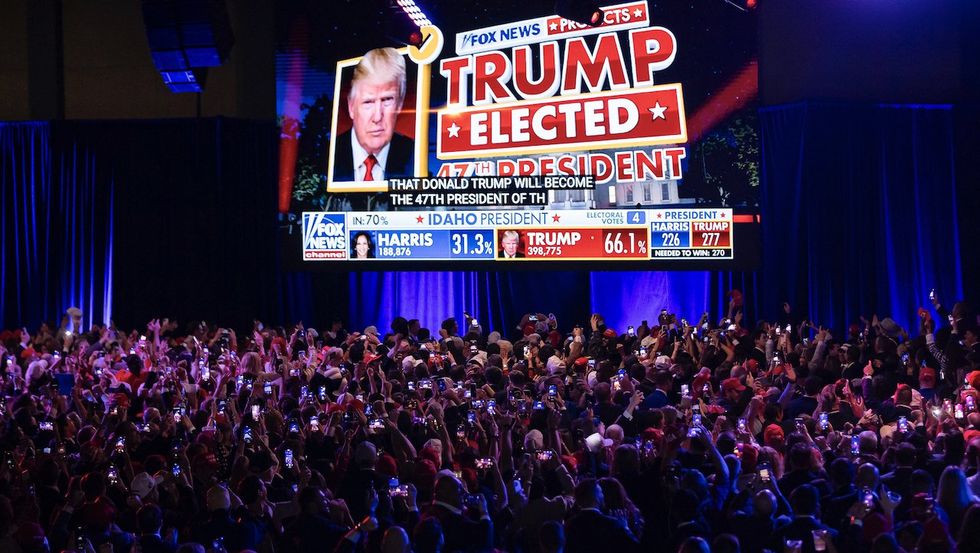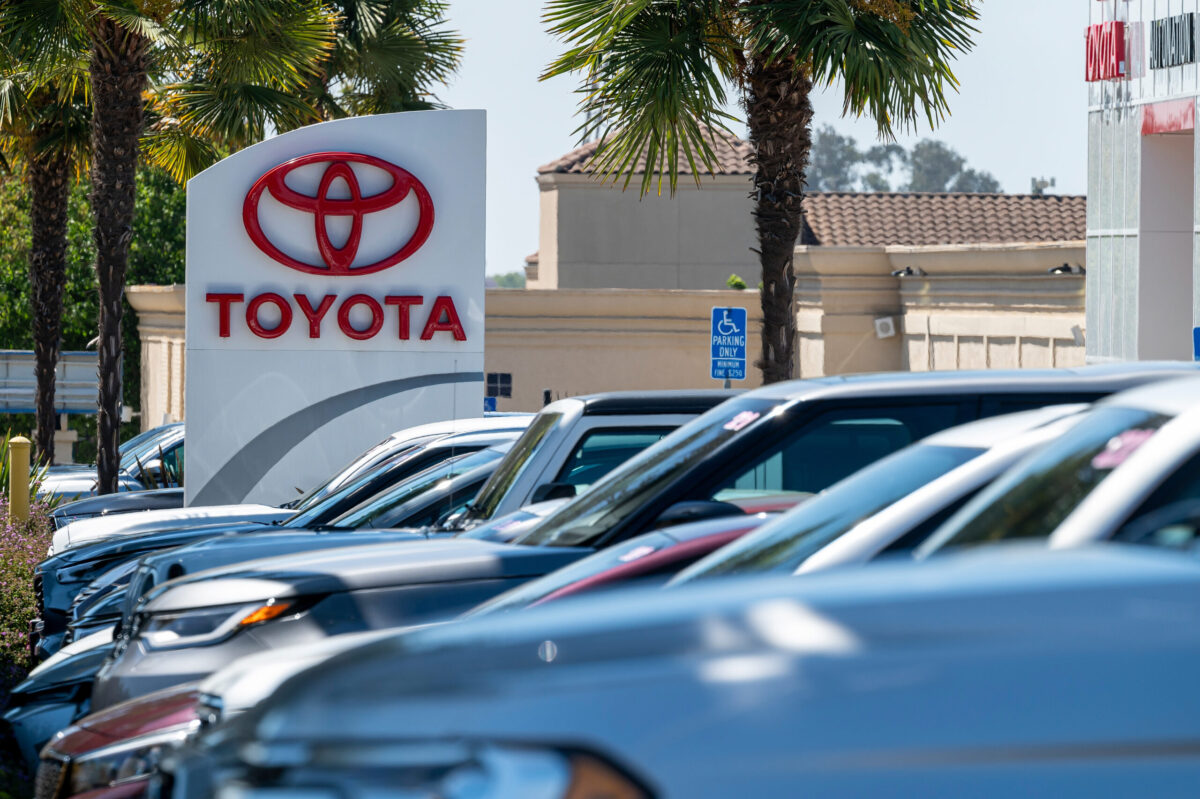Biden-Harris EV agenda turning into a disaster for jobs
'It’s not an exaggeration to say that we risk the wholesale destruction of the U.S. auto industry'


![]()

The Biden-Harris administration’s electric vehicle (EV) push is spurring auto manufacturers to rethink their production processes and cut thousands of jobs in the process, with experts warning the most recent round of layoffs are just the tip of the iceberg.
GM announced it will temporarily cut nearly 1,700 factory workers on Saturday as it retrofits its Fairfax, Kansas, factory to manufacture the electric Chevrolet Bolt instead of the gasoline-powered Chevrolet Malibu, joining fellow automaker Stellantis, which revealed plans to lay off 2,450 employees in August as it discontinues the classic version of its Ram-1500 truck in favor of an electrified pickup, according to Bloomberg and a Worker Adjustment and Retraining Notification notice. The layoffs are a canary in a coal mine for the blue collar job losses that the Biden-Harris administration’s EV push will create, as the vehicles require less labor to manufacture and depend more on Chinese parts than their internal combustion engine counterparts, experts told the Daily Caller News Foundation.
“The GM layoffs, following the Stellantis layoffs, show that auto jobs are going away to China from the United States,” Diana Furchtgott-Roth, director of the Center for Energy, Climate and Environment at the Heritage Foundation, told the DCNF. “With the [Biden-Harris] administration’s rules for forced renewables and EVs, China is nibbling at the foundations of American prosperity like termites nibble at the foundations of a house.”
Deindustrialization and globalization has led to a massive decline in traditional blue-collar jobs, with blue-collar work falling from 31.2% of total nonfarm employment in 1970 to roughly 13% in 2016, according to the Center for Economic and Policy Research.
China accounts for 41% of the world’s cobalt mining and 28% of the world’s lithium — two of the rare earth minerals essential to manufacturing the lithium-ion batteries that power EVs, according to The New York Times. As a result, China is projected to produce twice as many batteries as every other country combined by 2030, despite the billions in subsidies the Biden-Harris administration has put towards expanding U.S. EV battery production.
In addition to fears the Biden-Harris EV push will cause China to take American manufacturing jobs, O.H. Skinner, executive director of the Alliance for Consumers and the former solicitor general of Arizona, points out blue collar jobs would be lost due to differences in the EV manufacturing process.
“EVs require fewer moving parts and less final assembly at auto plants,” Skinner told the DCNF. “[However] they require a lot of mining of raw materials … and a lot of time and money assembling batteries, so the costs are still sky high for consumers, making [EVs] a lose-lose for U.S. workers and U.S. consumers.”
EVs have substantially fewer moving parts and require roughly 30% less labor to manufacture, according to a 2017 presentation from Ford Motors, reducing demand for American assembly line workers. A 2018 research study from the United Auto Workers found the EV transition could eliminate as many as 35,000 union auto manufacturing jobs, while a 2023 report from the America First Policy Institute found the Biden-Harris administration’s tailpipe emissions rule, which effectively stipulates 67% of all light-duty vehicles sold after model year 2032 be electric vehicles (EVs) or hybrids, would eliminate 117,000.
Despite the lower labor requirement, the average cost of a new EV is still roughly 10% higher than a gasoline-powered car due to their pricey battery packs, which can cost around $15,000 and are often manufactured by Chinese companies such as CATL and Gotion, both of which Republican lawmakers have pushed to blacklist due to concerns surrounding the companies ties to the Chinese Communist Party and forced labor.
As a result of elevated costs and a lack of charging infrastructure, American consumers have been hesitant to adopt EVs, with a June poll from The Associated Press-NORC Center for Public Affairs Research and the University of Chicago’s Energy Policy Institute finding 46% of respondents were unlikely or very unlikely to purchase an EV, and just 21% were “very” or “extremely” likely to make the change. Moreover, EV demand has slackened in 2024, with EV sales growing50% in the first half of 2023 and 31% in the first half of 2024, significantly less than the 71% increase seen in the first half of 2022.
The consumer hesitancy exists despite the White House offering a $7,500 federal tax credit for certain EVs to ease costs for buyers. It also comes in spite of the $7.5 billion earmarked for the Biden-Harris administration to install thousands of charging stations across the country in 2021, though only 38 operational individual charging spots had been established as of April 2024.
The Biden-Harris administration has maintained its tailpipe emissions rule in spite of these challenges, effectively stipulating that 67% of all light-duty vehicles sold after model year 2032 be electric vehicles (EVs) or hybrids.
“The GM layoffs serve as a stark reminder that the Biden administration’s rapid push toward electric vehicles (EVs), without adequately addressing China’s aggressive tactics to dominate the industry, is having a significant negative impact on American workers,” Nick Iacovella, senior vice president of public affairs and communications for the Coalition for a Prosperous America, told the DCNF. “Biden-Harris administration policies are investing billions in tax credits aimed at retrofitting American factories and bolstering domestic EV production. Yet, these efforts are threatened by China’s state-backed push to control the global EV market.”
As part of its goal of having EVs make up at least 50% of all new car sales by 2030, the Biden-Harris administration has lavished subsidies on automakers, making $12 billion in taxpayer funds available for manufacturers to retrofit their plants in August 2023 in what the White House claimed would create over 2,900 new high-quality jobs. GM claimed a retrofitting process — “the installation of new tooling” — was the reason for the Fairfax, Kansas, temporary layoffs.
“It may sound like hyperbole, but it’s not an exaggeration to say that we risk the wholesale destruction of the U.S. auto industry,” Mark Mills, Executive Director of the National Center for Energy Analytics, told the DCNF. “It is obvious that the subsidies are neither accelerating any putative, significant cost declines in EVs, nor making it feasible to completely restructure the auto industry. The subsidies, instead, are increasing the dependence on foreign materials and creating foreign jobs, especially in China.”
GM, Stellantis and the Biden-Harris administration did not respond to requests for comment.
This story originally was published by the Daily Caller News Foundation.
Content created by The Daily Caller News Foundation is available without charge to any eligible news publisher that can provide a large audience. For licensing opportunities of our original content, please contact [email protected].
SUPPORT TRUTHFUL JOURNALISM. MAKE A DONATION TO THE NONPROFIT WND NEWS CENTER. THANK YOU!
Originally Published at Daily Wire, World Net Daily, or The Blaze
What's Your Reaction?

















![‘[Bleeping] insanity’: Watch Joe Rogan unload on Biden, Zelensky, and Deep State as fears of World War lll grow](https://www.wnd.com/wp-content/uploads/2024/11/joe-rogan-20241122-jpg.jpg)














































































